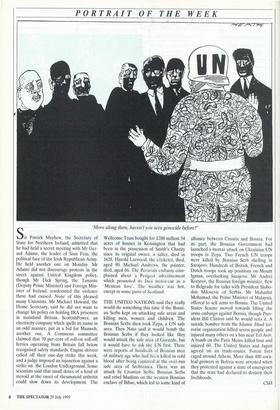PORTRAIT OF THE WEEK `Move along there, haven't you seen
genocide before?' Sir Patrick Mayhew, the Secretary of State for Northern Ireland, admitted that he had held a secret meeting with Mr Ger- ard Adams, the leader of Sinn Fein, the political face of the Irish Republican Army. He held another one on Monday. Mr Adams did not discourage protests in the street against United Kingdom policy, though Mr Dick Spring, the Tanaiste (Deputy Prime Minister) and Foreign Min- ister of Ireland, condemned the violence these had caused. None of this pleased many Unionists. Mr Michael Howard, the Home Secretary, said he did not want to change his policy on holding IRA prisoners in mainland Britain. ScottishPower, an electricity company which spells its name in an odd manner, put in a bid for Manweb, another one. A Commons committee claimed that 70 per cent of roll-on roll-off ferries operating from Britain fall below recognised safety standards. Engine-drivers called off their one-day strike this week, and a judge imposed an injunction against a strike on the London Underground. Some scientists said that small doses of a kind of steroid at the onset of rheumatoid arthritis could slow down its development. The Wellcome Trust bought for £280 million 54 acres of houses in Kensington that had been in the possession of Smith's Charity since its original owner, a salter, died in 1628. Harold Larwood, the cricketer, died, aged 90. Michael Andrews, the painter, died, aged 66. The Peruvian embassy com- plained about a Peugeot advertisement which promoted its Inca motor-car as a `Mexican fave'. The weather was hot, except in some parts of Scotland.
THE UNITED NATIONS said they really would do something this time if the Bosni- an Serbs kept on attacking safe areas and killing men, women and children. The Bosnian Serbs then took Zepa, a UN safe area. Then Nato said it would bomb the Bosnian Serbs if they looked like they would attack the safe area of Gorazde, but it would have to ask the UN first. There were reports of hundreds of Bosnian men of military age who had been killed in cold blood after being captured at the over-run safe area of Srebrcnica. There was an attack by Croatian Serbs, Bosnian Serbs and rebel Muslims on the western Bosnian enclave of Bihac, which led to some kind of alliance between Croatia and Bosnia. For its part, the Bosnian Government had launched a mortar attack on Ukrainian UN troops in Zepa. Two French UN troops were killed by Bosnian Serb shelling in Sarajevo. Hundreds of British, French and Dutch troops took up positions on Mount Igman, overlooking Sarajevo. Mr Andrei Kozyrev, the Russian foreign minister, flew to Belgrade for talks with President Slobo- dan Milosevic of Serbia. Mr Mahathir Mohamad, the Prime Minister of Malaysia, offered to sell arms to Bosnia. The United States Senate moved towards lifting the arms embargo against Bosnia, though Pres- ident Bill Clinton said he would veto it. A suicide bomber from the Islamic Jihad ter- rorist organisation killed seven people and injured many others on a bus near Tel Aviv. A bomb on the Paris Metro killed four and injured 60. The United States and Japan agreed on air trade-routes. Forest fires raged around Athens. More than 400 coca- leaf growers in Bolivia were arrested when they protested against a state of emergency that the state had declared to destroy their livelihoods.
CSH


















































 Previous page
Previous page